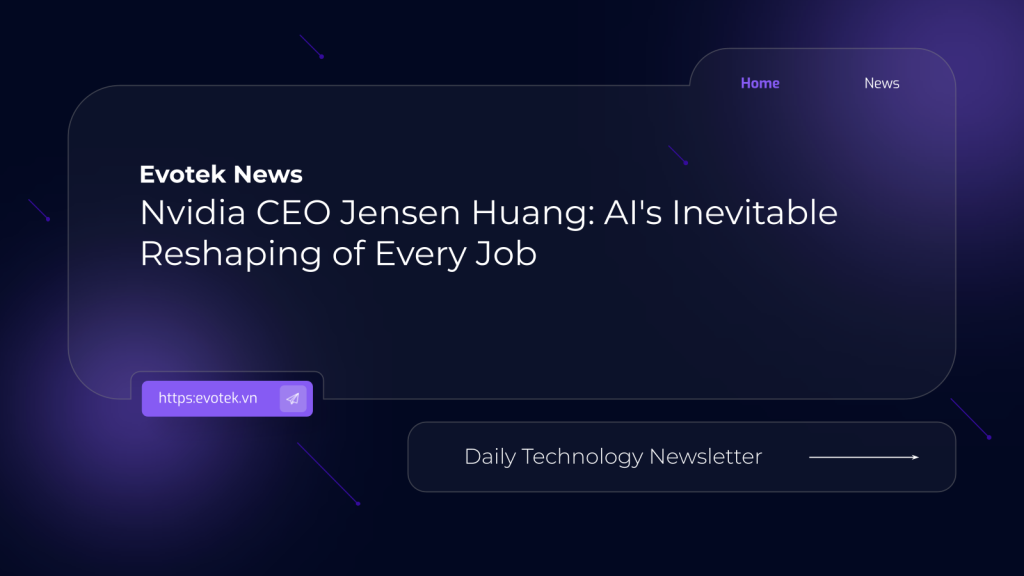The financial world recently buzzed as Nvidia, the powerhouse chipmaker fueling the artificial intelligence revolution, shattered records. Earlier this month, the company soared to an unprecedented market valuation of $3.92 trillion, briefly surpassing Apple’s December record of $3.915 trillion. Just days later, Nvidia etched its name in history, breaking the $4 trillion ceiling and propelling its visionary CEO, Jensen Huang, to become the world’s sixth richest person, with a net worth exceeding $143 billion.
With his personal wealth secured for generations, Huang marked this extraordinary milestone with a profound prediction that sent ripples across industries: “everybody’s jobs will be affected.”
Jensen Huang’s Vision: Productivity Gains Through AI
During an interview with CNN’s Fareed Zakaria, Huang reiterated this striking assertion, a topic that has been a long-standing discussion within the broader tech sector. At the heart of Huang’s forecast lies the concept of productivity – the conviction that AI will soon generate superior market value than human workers, achieving this more rapidly and at a lower cost. However, like many of his contemporaries, Huang also interwove a somewhat perplexing claim: that there will still be ample room for human roles, though these will evolve into currently undisclosed new forms.
“Some jobs will be lost,” Huang stated, “Many jobs will be created and what I hope is that the productivity gains that we see in all the industries will lift society.”
The practical implications of “lifting society” remain ambiguous. Despite the billions poured into AI development, critics argue that the leaders of these tech giants have largely failed to leverage their vast wealth to adequately prepare society for this predicted future. Instead, many appear to align with political agendas that favor dismantling social safety nets and privatizing public services, directly benefiting the ultra-wealthy.
AI Productivity: The Reality for Workers
While Nvidia’s stock price surged in the wake of Huang’s headline-grabbing interview, the on-the-ground reality for workers presents a less optimistic picture. If the CEO were to engage with everyday employees, he might discover that “productivity” is far from their primary concern regarding AI integration.
For instance, a mid-2024 study involving 2,500 workers revealed that a significant 77 percent reported a decrease in productivity and even higher workloads when utilizing AI. Nearly 40 percent of these workers attributed increased workloads explicitly to AI’s inaccuracies, while 47 percent confessed they “didn’t know how to achieve the expected productivity” gains promised by AI tools.
More recently, a comprehensive survey of 25,000 employees across 7,000 workplaces, conducted by the National Bureau of Economic Research in Denmark, found that enterprise AI contributed only negligible productivity gains overall, especially when compared to typical historical productivity growth. For the workforce, the study concluded, “AI chatbots have had no significant impact on earnings or recorded hours in any occupation.” This suggests that if AI is indeed on the verge of widespread job displacement, it’s doing so with remarkably little immediate impact on most employment metrics.
Huang’s Evolving Stance on AI Automation
While a multitude of startup entrepreneurs and PR strategists have spent years promoting the AI automation narrative, Nvidia CEO Jensen Huang’s latest forecast marks a notable shift from his previous comments on the subject. Earlier in June, Huang vehemently challenged Anthropic CEO Dario Amodei’s assertion that AI could automate half of all entry-level office jobs within five years – a claim so far removed from the technology’s current capabilities that it seemed almost meaningless.
“One, he believes that AI is so scary that only they [Anthropic] should do it,” Huang stated at the time. “Two, [he believes] that AI is so expensive, nobody else should do it… and three, AI is so incredibly powerful that everyone will lose their jobs, which explains why they should be the only company building it.”
This previous statement was a sharp rebuke of Amodei’s perceived AI fearmongering, reflecting what was, at the time, a seemingly more measured perspective from someone in Huang’s influential position. It is important to note that Nvidia currently commands approximately 90 percent of the datacenter chip market, wielding immense power over the tech industry, Fortune 500 companies, and even U.S. military interests. Unlike many companies reliant on his hardware, Huang’s Nvidia derives its core business less from an AI automation sales pitch and more from a consistent demand for its cutting-edge chips.

 日本語
日本語 한국어
한국어 Tiếng Việt
Tiếng Việt 简体中文
简体中文